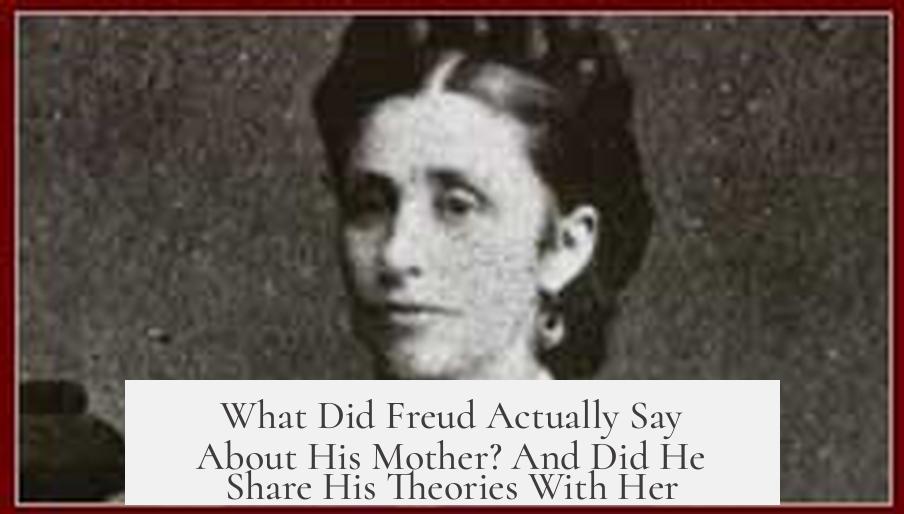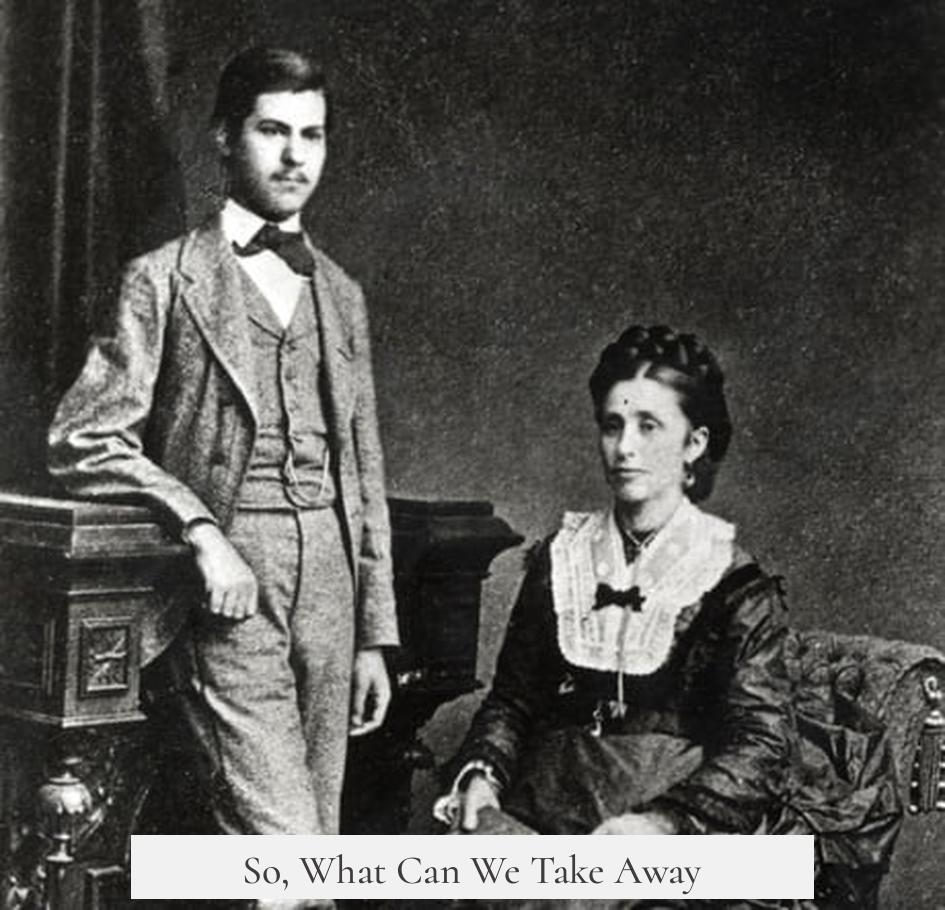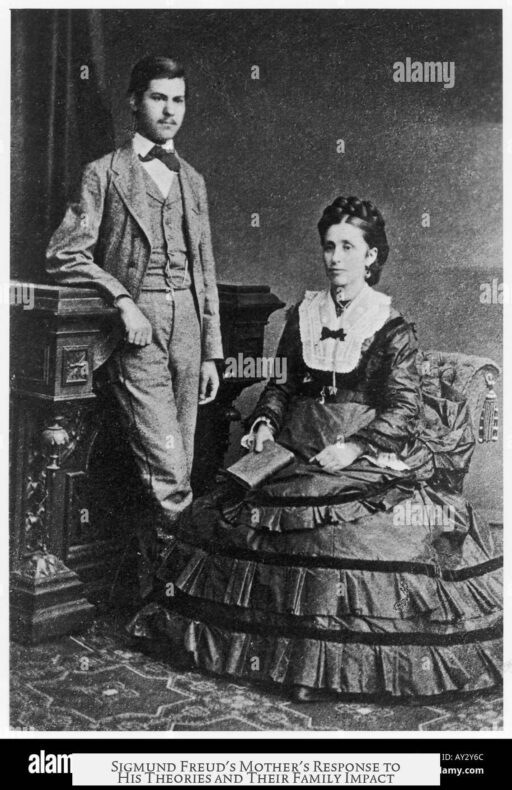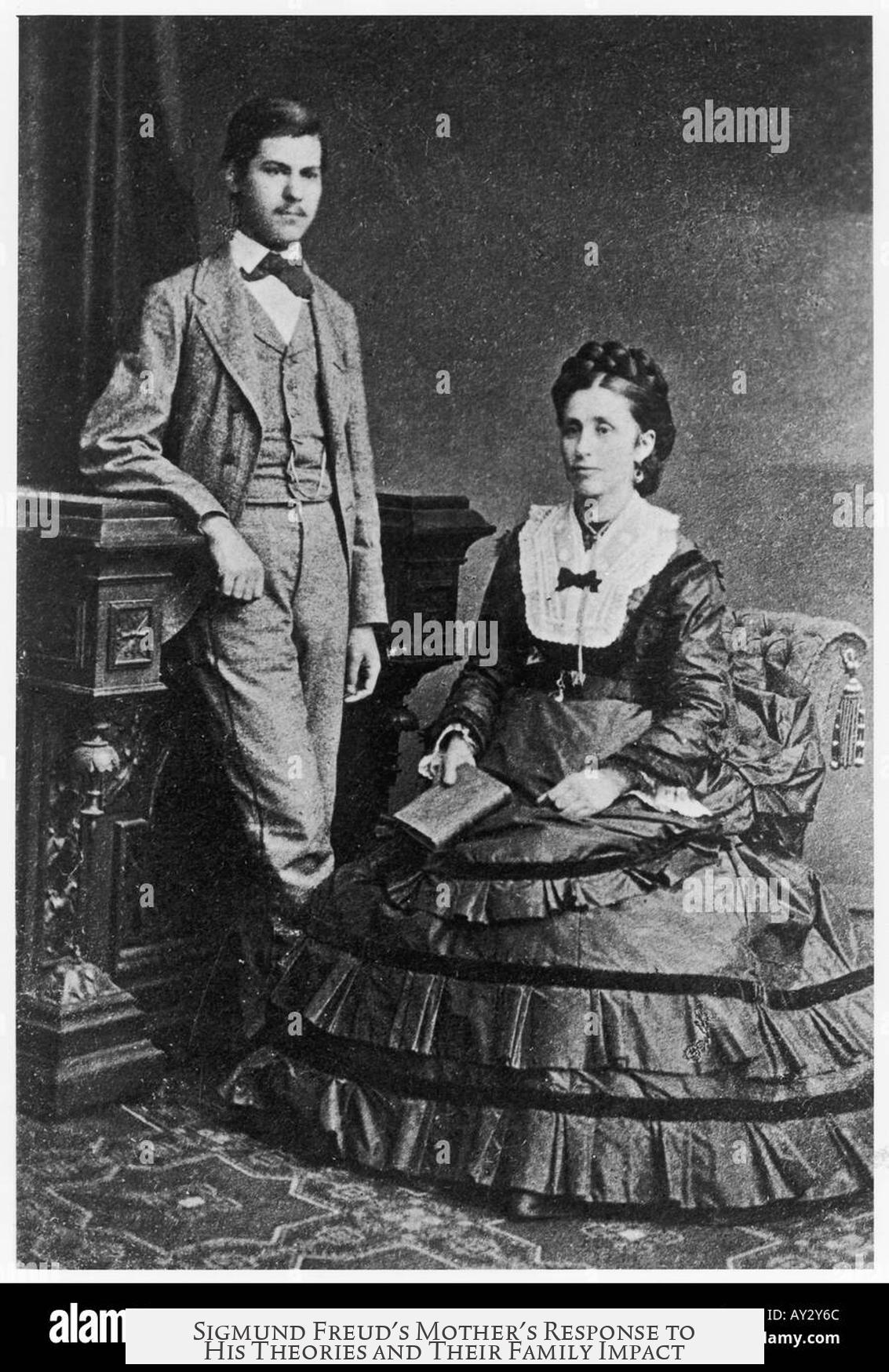Sigmund Freud’s mother, Amalie Freud, likely knew of his psychoanalytic theories but her specific reaction to them remains unknown. No reliable historical records, letters, or biographies provide insight into her views on Freud’s work.
Despite many detailed studies of Freud’s life and his childhood relationship with Amalie, no direct evidence reveals her attitude toward the groundbreaking and controversial ideas he developed. Freud’s psychoanalysis, including concepts like the Oedipus complex and the importance of mother-child bonds, arose during his adult years, but references to her in his writings are scarce and focus more on their familial connection than on intellectual feedback.
Amalie held a strong, commanding personality at home. Family accounts describe her as both charming and strict, controlling her household with a firm hand. She adored Sigmund deeply, regarding him as her favorite among seven children. She called him “my golden Sigi” and firmly believed he was destined to succeed. This lifelong devotion offers a clue that she supported him personally, even if her thoughts on his theories are not documented.
Biographers such as Ernest Jones (1953), Peter Gay (1988), and Elisabeth Roudinesco (2016) do not mention any detailed correspondence or discussion about Freud’s psychoanalysis between mother and son. For example, the two letters from Freud to Amalie published in 1960 contain no mention of his work, focusing instead on personal and family matters.
The era’s cultural context also helps explain the lack of recorded opinion from Amalie Freud on her son’s theories. Women’s voices were less valued publicly in late 19th and early 20th-century Austria. She may have chosen not to speak openly on intellectual matters or was never prompted to discuss them. Additionally, any documents containing her thoughts might remain untranslated or obscure within archives.
Regarding Freud’s presentation of his ideas, he articulated them as technical theories aimed at understanding human psychology and mental illness. His descriptions of concepts like the Oedipus complex were metaphorical and clinical rather than the sensationalized versions popularized later. If discussed with his mother, Freud probably did not use provocative or explicit language that might have shocked her.
Amalie had already raised six children, so Freud’s claims about children’s emotional attachments to their parents may have seemed like common sense within a traditional household. This ordinary understanding of child development means she may have viewed his work as less radical in everyday life.
In summary, despite Freud’s emphasis on mother-child relationships in his theories and his close emotional connection with Amalie, there is no record of her reaction to his psychoanalytic work. Her support for Sigmund as her son is well attested, but any opinion on his scientific ideas remains unknown.
| Aspect | Details |
|---|---|
| Known Reaction | No documented response to Freud’s theories from Amalie Freud. |
| Relationship | Amalie adored Freud, called him “my golden Sigi,” showing personal support. |
| Historical Records | Biographies and Freud’s letters do not mention her views on psychoanalysis. |
| Cultural Context | Women’s opinions were often undervalued; possibly she was never asked or chose silence. |
| Possible Theory Discussions | Freud likely used technical, non-sensationalized language in any family discussions. |
- Amalie Freud’s attitude toward her son’s theories is undocumented.
- She adored Sigmund and supported him as her favored child.
- Freud’s letters and biographies do not reference her intellectual views.
- Social context may have suppressed or de-emphasized her opinions.
- Freud’s explanations to family were likely clinical rather than provocative.
How Did Sigmund Freud’s Mother React to His Theories?

We simply don’t know how Amalie Freud, Sigmund’s mother, reacted to his psychoanalytic theories. Despite being undoubtedly aware of her son’s groundbreaking ideas, there is no clear record of her opinions, critiques, or feelings about them.
Let’s dive into this mystery surrounding one of history’s most influential thinkers and the woman who played such a pivotal role in his life.
The Silent Backdrop: No Evidence, No Explanation
Imagine a famous scientist unveiling revolutionary ideas, yet the closest family member’s reaction remains invisible. That’s basically the case here. Scholars, biographers, and historians sifted through dozens of records, letters, and biographies—nothing. Freud’s mother never appears voicing her thoughts on psychoanalysis.
Even legendary biographies by Peter Gay or Ernest Jones, both meticulous about Freud’s life, skip any mention of Amalie Freud’s thoughts on his work. Freud himself never discusses her views in his abundant letters or writings. It’s like she’s a ghost in the psychoanalytic story.
Did she shrug and dismiss it? Did she secretly find it fascinating? Or was she simply indifferent? No one knows.
The Mother-Son Dynamic: Adoration Meets Mystery
What we *do* know is that Amalie adored Sigmund. He was her “golden Sigi,” the favorite son of seven children. Her lifelong adoration is well documented by family accounts and even visitors who met her and heard her praise for Sigmund.
However, Freud himself had a complex relationship with her. While he idolized and feared her in his early years, there’s evidence he felt a kind of freedom after she passed away. Yet none of this sheds light on her stance about his theories.
Amalie was a strong, sometimes volatile personality, described by relatives as both a tyrant at home and charming when strangers were near. So she certainly wasn’t someone to be dismissed lightly—but again, this strong personality left no statement on psychoanalysis.
Why the Silence?
Several reasons might explain this silence. Here are some possibilities:
- Social Context: Amalie lived in a male-dominated society where women’s opinions often held little public weight. Austria gave women the vote only when she was 84, so conversations about psychoanalysis may not have reached her in a way she felt compelled or allowed to express.
- Privacy and Priorities: Raising seven children and managing a household in the 19th century was no joke. She might have had more pressing concerns than delving into complicated psychological theories.
- Untranslated Archives: There’s a chance her opinions exist in obscure German letters or papers, archived but never translated. If so, they remain hidden from the English-speaking world.
What Did Freud Actually Say About His Mother? And Did He Share His Theories With Her?

Freud revered the mother-child relationship as central to human psychology—a key pillar in his theories. Yet, curiously, there’s almost no research on how he interacted with his mother as adults. His references to her in his massive writings are brief and filled with ambivalence.
When Freud talked about his theories—particularly the Oedipal complex—it wasn’t about a literal sexual desire of a child for the mother. It was metaphorical, explaining complex mental processes leading to neuroses.
If Freud shared his work with Amalie, he likely presented it as clinical and serious theories, not sensational or “sex-obsessed” pop psychology. Perhaps this approach made it easier for her to embrace or at least tolerate his work without moral outrage.
Living Example of His Theories?
Could Amalie’s own character and relationship with Sigmund have shaped his theories? Possibly. She was a formidable matriarch with a “strong personality”—traits that echo Freud’s emphasis on strong parental influence during development.
Moreover, her unwavering faith in Sigmund as the “marked for success” child could have bolstered his self-confidence and drive to push controversial ideas on the world stage.
Did Family Members Comment?
Freud’s niece, Judith Bernays Heller, paints a vivid picture of Amalie—a woman with a volatile temper but a good sense of humor, especially when laughing at herself. Still, Judith’s reflections do not touch on Amalie’s opinions regarding psychoanalysis.
Visitors to the Freud household often remarked how proud a storyteller Amalie was about Sigmund’s achievements, but they mention none of her critiques or support for his ideas themselves.
Why Does It Matter?
You might wonder why it’s important to know how Freud’s mother felt about his theories. Here’s a thought:
Understanding family reactions provides deep insight into the personal lives of impactful thinkers. The way Sigmund’s ideas rippled through his immediate circle can tell us much about the social and psychological context these theories emerged from.
Moreover, the story of Amalie Freud challenges our assumptions about historical narratives. Not every influential figure’s family history fits neatly into a neat dramatic arc.
So, What Can We Take Away?

| Known Fact | Unknown/Missing Piece |
|---|---|
| Amalie adored her son Sigmund and was proud of his work. | Her personal opinion on psychoanalytic theories. |
| Sigmund Freud had a complex and ambivalent relationship with his mother. | How this relationship affected her reception of his ideas. |
| No letters or biographical accounts mention her views on his work. | Potential undiscovered archival materials. |
Final Thoughts: Mystery Intact
Despite exhaustive research, Freud’s mother remains an enigmatic figure when it comes to his psychoanalytic legacy. Perhaps she found it fascinating but preferred to stay out of it publicly—or maybe she simply viewed her son’s work as another chapter in the complexities of raising a large family.
In any case, this mystery reminds us that history doesn’t always provide answers. Sometimes, the silence itself is the story.
“Amalie Freud was a mother first—and in that role, she may have seen her son’s theories as natural observations rather than revolutionary doctrines.”
So, next time you ponder Freud’s ideas, spare a thought for the quiet figure who undoubtedly influenced him but whose voice about his work was never heard.



